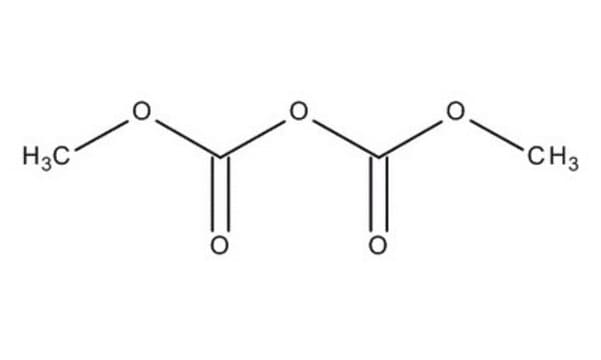159220
Diethyl pyrocarbonate
96% (NT)
Synonym(s):
DEP, DEPC, Diethyl dicarbonate, Diethyl oxydiformate, Ethoxyformic acid anhydride
About This Item
Recommended Products
Quality Level
Assay
96% (NT)
form
liquid
refractive index
n20/D 1.398 (lit.)
bp
93-94 °C/18 mmHg (lit.)
density
1.101 g/mL at 25 °C (lit.)
shipped in
wet ice
storage temp.
2-8°C
SMILES string
CCOC(=O)OC(=O)OCC
InChI
1S/C6H10O5/c1-3-9-5(7)11-6(8)10-4-2/h3-4H2,1-2H3
InChI key
FFYPMLJYZAEMQB-UHFFFAOYSA-N
Looking for similar products? Visit Product Comparison Guide
General description
Application
- nuclease inhibitor for the extraction of undegraded nucleic acids from etiolated and green plant tissues
- an antimicrobial additive
- ribonuclease inhibitor
- histidine residue modifier
- reagent for conversion of imines to carbamates
Biochem/physiol Actions
Signal Word
Warning
Hazard Statements
Precautionary Statements
Hazard Classifications
Acute Tox. 4 Oral
Storage Class Code
10 - Combustible liquids
WGK
WGK 3
Flash Point(F)
156.2 °F - closed cup
Flash Point(C)
69 °C - closed cup
Personal Protective Equipment
Certificates of Analysis (COA)
Search for Certificates of Analysis (COA) by entering the products Lot/Batch Number. Lot and Batch Numbers can be found on a product’s label following the words ‘Lot’ or ‘Batch’.
Already Own This Product?
Find documentation for the products that you have recently purchased in the Document Library.
Customers Also Viewed
Articles
Solid-state lithium fast-ion conductors are crucial for safer, high-energy-density all-solid-state batteries, addressing conventional battery limitations.
Solid-state lithium fast-ion conductors are crucial for safer, high-energy-density all-solid-state batteries, addressing conventional battery limitations.
Solid-state lithium fast-ion conductors are crucial for safer, high-energy-density all-solid-state batteries, addressing conventional battery limitations.
Solid-state lithium fast-ion conductors are crucial for safer, high-energy-density all-solid-state batteries, addressing conventional battery limitations.
Our team of scientists has experience in all areas of research including Life Science, Material Science, Chemical Synthesis, Chromatography, Analytical and many others.
Contact Technical Service








